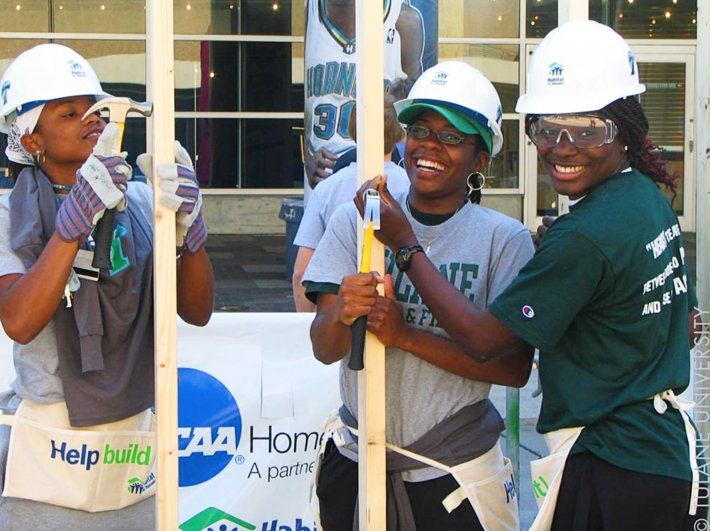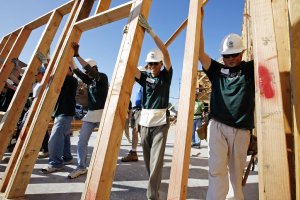Natural disasters, wildfires, the loss of a job, the catastrophic illness or death of a family's primary source of income, rising home prices, and rising rents—there are so many ways for an individual or family to suddenly find themselves without a roof over their head.

The resulting sense of vulnerability and hopelessness can be crippling. On the California coast alone, tent cities exist from the southern regions of San Diego all the way to Eureka, and the homelessness crisis continues to grow, despite efforts to clear the encampments and make street sleeping illegal.
Nationwide, the homeless count exceeds 500,000, with people living in their cars, outdoors, or in abandoned buildings and parking garages—often in extreme temperatures. It’s enough to cause one to throw up their hands in surrender and surmise that there’s just no solution.
The volunteers for Habitat for Humanity are using their hands in a far different manner—by “Seeking to put God’s love into action, Habitat for Humanity brings people together to build homes, communities, and hope. Their vision is “a world where everyone has a decent place to live.”
Started in the mid-1960s by Georgia farmer and biblical scholar Clarence Jordan for the purpose of partnering to build with families in need of sustainable housing, it quickly expanded and eventually led to Habitat for Humanity International in 1976 with projects throughout the U.S. and in more than 70 countries.
While Habitat for Humanity is based on Christian beliefs, it holds a firm stance against proselytizing. Habitat refuses to work with any person or organization that insists on proselytizing as part of the process of building or rebuilding.
In its annual report for 2021, Habitat for Humanity reported that since its founding in 1976, the organization has helped more than 39 million people build or improve the place they call home. And that year, more than 500,000 volunteers helped build, advocate and raise awareness about the global need for shelter in the past fiscal year.
Volunteers stepping up to assist each year often referring to it as the “best experience of their lives,” Clarence Jordan’s original dream of bringing people together to build homes and communities has been realized.
Former president Jimmy Carter continues to work with the organization at the age of 97, saying, “Habitat provides a simple but powerful avenue for people of different backgrounds to come together to achieve those most meaningful things in life. A decent home, yes, but also a genuine bond with our fellow human beings. A bond that comes with the building up of walls and the breaking down of barriers.”
_______________
From its beginnings, the Church of Scientology has recognized that freedom of religion is a fundamental human right. In a world where conflicts are often traceable to intolerance of others’ religious beliefs and practices, the Church has, for more than 50 years, made the preservation of religious liberty an overriding concern.
The Church publishes this blog to help create a better understanding of the freedom of religion and belief and provide news on religious freedom and issues affecting this freedom around the world.
The Founder of the Scientology religion is L. Ron Hubbard and Mr. David Miscavige is the religion’s ecclesiastical leader.
For more information visit the Scientology website or Scientology Network.


